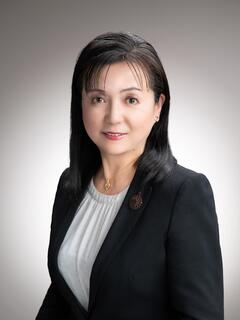No.1 Thoughts on the “age of globalization”
Update date: May 15, 2023
(Published in the May 15, 2020 issue of Lifelong Learning Newsletter “Hiroba”)

My name is Makiko Sugimoto and I was appointed as the Superintendent of the Inagi City Board of Education on March 2nd of this year.
We deliver the "Superintendent of Education Column" as a message to citizens about the state of education and learning.
In 2025, it is scheduled to be published in "Hiroba" four times.
Thoughts on the “age of globalization”
The accelerating development of civilization, such as AI in recent years, is further expanding the possibilities of human behavior. In addition, modern people who have experienced the new coronavirus have learned how to instantly communicate and discuss with people all over the world. Under these circumstances, I have shared my growth experiences with many children, and I myself am someone who naturally takes time to understand things and sometimes misses the point of fast-paced conversations. I feel a little anxious and concerned about the trend of placing emphasis on the ability to communicate with diverse people.
The following episode is introduced in an essay by film director Nobuhiko Obayashi (passed away in 2020). Leonardo da Vinci, the creator of the world-famous painting ``Mona Lisa'' and said to have been a genius in the field of science and truly ``all-purpose'', said, ``Horses are the only vehicle for humans to get from point A to point B.'' "That's the best speed, because it's the happiest speed for humans." Mr. Obayashi goes on to say in the same book, ``There is no way that a man like da Vinci did not think about a car society and flying airplanes.'' ``While traveling, I met people and talked with them.'' ``I wonder how many things like seeing the stars shining, being blown by the wind, and so on bring a rich sense of happiness into the hearts of people who travel.'' I'm talking. This episode has stayed with me for a long time, and I look back on it from time to time during my time with students as a junior high school teacher.
Well, more than 10 years have passed since I encountered this essay, and after the coronavirus pandemic, I had the opportunity to visit Finland in January of this year for an educational inspection tour. Before traveling, I was most worried about the language barrier, but that anxiety was quickly dispelled and I was able to interact with the local people during my week in a far away country with peace of mind. I did. What I was most grateful for was that the Finnish people I met there were able to respond to my clumsy speaking skills due to my poor vocabulary. The people of Finland, whose official languages are Finnish and Swedish, also learn English from the first grade of elementary school, and everyone speaks English freely on the streets. Naturally, my English ability was not up to par with them, and since I was in the position of being a ``socially vulnerable person'' in a foreign country, the sense of security that the other person was adjusting to me was very comforting.
Furthermore, what surprised me most in this country was that cars always stop at crosswalks, and elevators do not have "close" buttons. Car drivers should be aware of pedestrian movements and stop when pedestrians arrive. People who want to get on the elevator board the elevator in an orderly manner without rushing, and after a certain amount of time, the doors slowly close and the elevator begins to move. What I experienced in this ``educated country'' was that people's daily routine was to pay attention to and adapt to the pace of those around them.
During this experience in a foreign country, the essay I encountered 10 years ago came back to life in my mind, and I wondered why Leonardo da Vinci said, ``Horses are the happiest speed for humans.'' I think I'm starting to see why. Da Vinci believed that a sense of happiness could be brought about when humans and horses, two living creatures, understood each other's natural rhythms and synchronized their heartbeats. I think they thought that it would create an emotional experience and make a spiritually enriching journey a reality.
After returning to Japan, I returned to my daily life in Japan. Naturally, we spend our days enjoying the conveniences that Japanese society has created. Even so, now, while thinking back to Da Vinci's story and the streets of Finland, I am valuing my own natural rhythm, and at the same time trying to understand the rhythms of the feelings and thoughts of those around me. I tell myself that I will try to respond accordingly. In today's society, which is moving toward achieving the SDGs based on the concept of "leaving no one behind," the basics of being a true "global person" are first to have confidence and pride in one's own pace, and second, to respect the people around you. I believe that it is important to have a sense of respect for others, to value the things around you, and to enjoy the diverse scenery around you in such a relaxed manner.
One month has passed since the new year. Both adults and children may be starting to feel physically and mentally tired. At a time like this, I would like to work together with the people I meet to return to the ``rhythm that is most comfortable for human beings,'' step by step, working together with my heart and strength. In order to contribute to the promotion of a "global society."
Quotations/References Nobuhiko Obayashi “Are we really happy now?” (included in “Junior High School Textbook: Being Here Now” Yotsuya Round)
Inquiries regarding this page
Inagi City Education Department Educational General Affairs Division
2111 Higashinagumanuma, Inagi City, Tokyo
Phone: 042-378-2111 Fax: 042-379-3600







